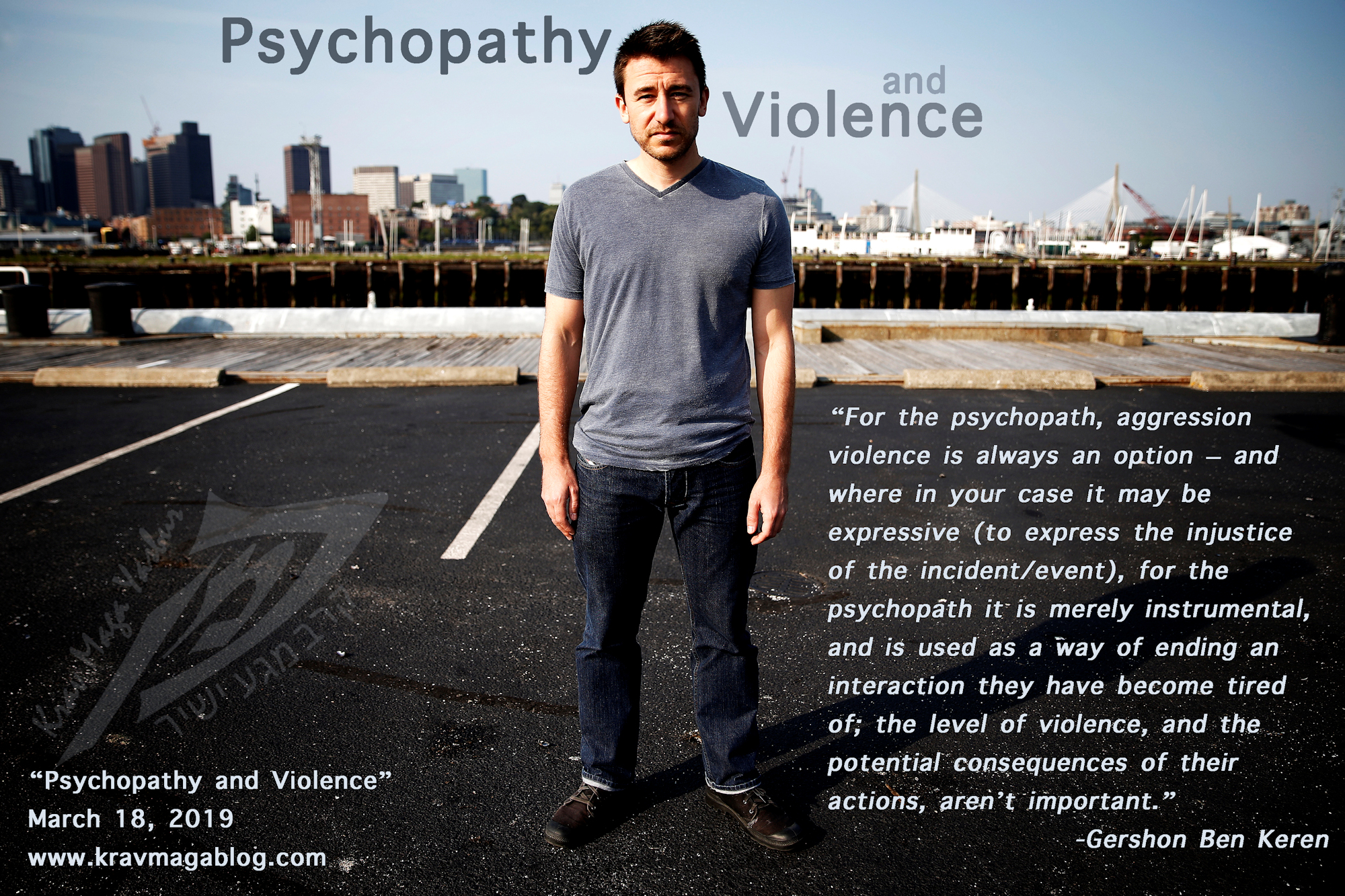This is the first of two articles, that will look at two personality disorders which are associated with violent behavior and violent offending: Psychopathy/Antisocial Personality Disorder (APD) and Borderline Personality Disorder (BPD). Although the DSM-V, doesn’t talk specifically about psychopathy, it recognizes it as sub-type of Anti-Social Personality Disorder, so whilst the DSM recognizes psychopathy as a type of this disorder the two are not synonymous. Whilst true psychopaths only make up 2-3% of the population – and this appears to be universal throughout both developed and developing countries – they are estimated to account for around 50% of all violent offenses, so there is a benefit to understanding this disorder, and being able to recognize when we are dealing with such individuals. It is worth noting that there is also debate and discussion around the existence of primary and secondary psychopathy with primary psychopaths committing anti-social acts due to an idiopathic lack of fear and empathy, whilst secondary psychopaths do so with a sense of fear and remorse; which is why it is argued that they are not “true” psychopaths i.e. they don’t truly lack empathy, which would be a pertinent negative – a significant missing condition – in any diagnosis of psychopathy. It is not just a difference in empathy that separates the two types; decision-making is also a factor, with primary psychopaths demonstrating a level/degree of calculation before they act – they know exactly what they are doing - whilst secondary psychopaths tend to be more impulsive and act without thinking, which would go some way to explaining why they might feel remorse and regret concerning their anti-social acts and behaviors.
As well as a complete lack of empathy, and not caring how their actions might negatively affect others, psychopaths share certain traits with narcissists – in fact those with clinically defined disorders often have co-morbid symptoms with others - in that they are also egocentric (their needs are the only ones that matter, and these can be met at the expense of others), often grandiose and dominant individuals. However, they differ from Narcissists in one significant regard; other people’s opinions of them don’t matter i.e. they don’t care enough about others, to care about their opinions, and how they might be perceived. So, whilst both disorders share egocentricity as a characteristic/symptom, psychopaths use other people instrumentally to achieve a goal, not caring about how they are perceived, while narcissists engage in activities so that they can use others’ opinions of, and reactions to them, to reassure themselves of the personal image that they have created – one which, recognizes them as special, different, and unique individuals, who are more deserving of things than others. The psychopath may believe they are superior to others, but they don’t require anyone else to recognize this.
The relationship between the use/understanding of language and psychopathy is an interesting one. Cleckley (1976) stated that psychopaths suffered from a deeply rooted semantic disorder, where the emotional and affective aspects of conversation(s) are unable to be processed: words contain no meaning beyond their dictionary definitions and are translated and understood in a robotic manner/fashion. The emotional context of a conversation or verbal exchange isn’t registered, and everything is processed literally. This allows them to talk and share their thoughts openly and graphically without recognizing that what they’re saying could be deemed as rude and offensive. Just as they’re unable to interpret the emotional meaning behind someone else’s words, they also have difficulty using emotion in their own language. Psychopaths are not alone in this, as those who suffer from Alexithymia, also have a problem with the emotional component of verbal cognition; and the disorder’s prevalence is much higher than psychopathy, with it estimated that around 10% of the population experience this to some degree. People with the disorder have difficulties describing their feelings, a deficit of awareness concerning the emotional state of others, and an insensitivity concerning the things that they say. It is worth understanding that there can be a difference between those who mean to be rude and aggressive, and those who happen to say rude and aggressive things, etc. Both types tend to use fewer “emotional words” in their conversations/interactions – psychopaths, because of their insincerity, and alexithymics, because such words don’t register with them. Those with both disorders are prone to violent outbursts and use physical action to relieve stress, however where psychopaths are often charming and interesting, alexithymics lack creativity and imagination, and so tend to be more boring.
Those with psychopathy don’t understand or respect social norms. If you’ve been waiting for a parking spot, and before you’re able to maneuver your car in, somebody else takes it, you have every right to be angry i.e. there was no way that the other person didn’t see you pulled up with your indicators on, waiting for the other car to pull out. For a psychopath, they require that spot, and if it’s available, they’ll take it, regardless of the accepted social norm that it should be yours because you were there first. Maybe you get out of your car – forgetting that from a personal safety perspective your best response would be to drive on, as you never know who you might be dealing with - and giving them the benefit of the doubt, you explain to them that they’ve taken the spot you were waiting for. They may fail to register your emotional state, and simply clinically process the words you are saying, decide that they are unimportant, and move on; how you are affected by what they did isn’t going to bother them. When they reply to you, they may come off as emotionally shallow, matter-of-fact, and completely indifferent. If you continue to bother them over this incident, they may decide that the easiest and quickest way to end the interaction is to reach into their trunk and hit you with a tire iron. For the psychopath, aggression violence is always an option – and where in your case it may be expressive (to express the injustice of the incident/event), for the psychopath it is merely instrumental, and is used as a way of ending an interaction they have become tired of; and to them the level of violence, and the potential consequences of their actions, aren’t important.
It is always worth trying to assess who it is you are dealing with, and not fall foul to the assumption that the other person is somebody like you. In any form of verbal confrontation, we should be continually processing a person’s attitude and responses. If somebody isn’t highly emotional in a situation in which we’d expect them to be, you’re probably either dealing with somebody who is trained, and/or a psychopath. Whilst I always recommend disengagement first, this time there’d be good reason to speed up your departure.
Share:

Gershon Ben Keren
2.8K FollowersGershon Ben Keren, is a criminologist, security consultant and Krav Maga Instructor (5th Degree Black Belt) who completed his instructor training in Israel. He has written three books on Krav Maga and was a 2010 inductee into the Museum of Israeli Martial Arts.
Click here to learn more.

